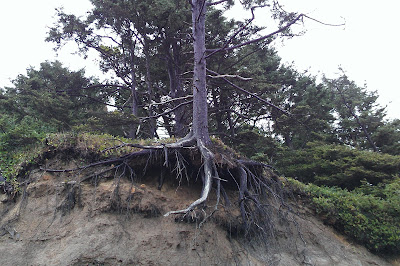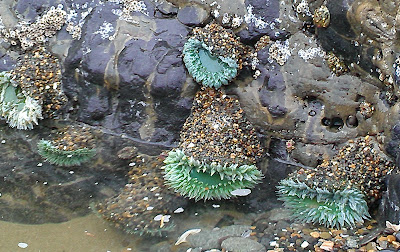(If you received this
blog by email, you might want to visit the actual site. The pictures work much
better there.
Just click on the
title “Entering 2017”)
Not a bad view to
welcome the new year, eh? We just got back from a trip to Oregon, welcoming the
new year on the coast, and then moving on to Portland for the biennial National
Multicultural Conference and Summit (NMCCS), a gathering of (mostly)
psychologists—about 800 of them this year—who are interested in multicultural
issues. I had originally waffled about whether to attend this conference, but
after the election, I knew I needed to be there. Given the state of the nation,
it was the perfect way to return from the coastal retreat to the cultural fray.


The time at the
coast was, predictably, relaxing and rejuvenating. We were welcomed by a rainbow, proof that we were at the right place. Then for three days, we bundled up for cold walks
on the beach, ate good food in small local restaurants (which were pretty
quiet, once the New Year’s partying was over), took multiple redundant photos of Haystack
Rock and some of the beach as it changed colors, and conversed with gulls accustomed to
handouts.


We slept with the window open and the ceiling fan on so we could hear
and smell the ocean during the night.
And then, re-entry.
NMCCS is something of a haven for people who are committed to diversity work. I
think it’s the only place I regularly hang out where I am, along with other
white people, in the numerical minority for days. My queer identity is a part
of the “multicultural” programming, but the (relative) invisibility of this
identity means that my whiteness marks me as an outsider, for a change. An
important position to experience occasionally—more often than I typically do.

The beauty of this
space is that people collectively assume that those around them are firmly
invested in issues of diversity and work against oppression, so it’s never
necessary to defend or explain a position that honors these issues as central (rather
than peripheral) to how we do psychology and how we function in the world. As a
result. it’s a remarkably non-judgmental gathering. People generally trust the
good intentions of others, grant space for “mistakes,” and honor growth rather
than perfection in understanding the experiences and perspectives that folks
bring with them.
I always learn
here, and I always feel challenged in realizing what I didn’t know. This year,
it had an added impact for me: it was one of several recent experiences that
have left me in a reflective mood about my own place in the world—appropriate
for a new year. More on that later.
So, let me take you
on a quick tour of my time at the conference and some of the insights I gleaned
while I was there. I was very aware from the start of the vigilance that folks who gathered for this event are feeling in the wake of November’s
election, with frequent references to the incoming administration and the mixture
of anger and anxiety that its ascendance evokes. Both the pre-conference
reception and the opening plenary began by describing this conference as a
place of safety, where “all of your complex identities” are welcome, a place to
“enjoy feeling brave,” to “renew your strength, encourage, and be encouraged.” It seemed clear to
me that other folks came to this conference guided by an impulse similar to
mine: to join with a like-minded community in nourishing energy for the
challenges ahead. Sprinkled among these comments were summons to “carry the water, even when it’s not popular” and “speak up anyway.” These words of encouragement reminded me of a Martina McBride song, “Anyway,” which suddenly seems totally suited to this moment in history. Excerpts:
Anyway
You
can spend your whole life building
Something from nothin'
One storm can come and blow it all away
Build it anyway
You
can chase a dream
That seems so out of reach
And you know it might not never come your way
Dream it anyway
…..
This
world's gone crazy
It's hard to believe
That tomorrow will be better than today
Believe it anyway
…..
You
can pour your soul out singing
A song you believe in
That tomorrow they'll forget you ever sang
Sing it anyway
Yeah, sing it anyway
I
sing
I dream
I love
Anyway
If feeling beseiged,
these people were also inspired and inspiring. “Don’t let anyone take away your
power,” one speaker urged, “the struggle is as important as the outcome.” More
than once, I heard the presidential campaign and election described as a backlash—and
this framed as good news: Those who resist diversity wouldn’t work so hard to
stifle, deny, and discredit it if they weren’t frightened by how far we’ve
come, what a force we can be for change. An empowering perspective that
certainly inspires me to more action!
So, besides these
general messages, what else did I learn? I’ll just mention a few sessions to
suggest the flavor of the conference.
In one session, elders from several indigenous groups discussed their experiences with colonization. Most of the material they discussed was familiar to me from previous events and workshops I’ve attended. But drenched in two hours of references to colonization, this information took on a new quality that changed my gut sense of indigenous experiences, erasing any impulse to exoticize and leaving only the reality of systemic, persistent, to-the-bone deep marginalization. And remarkable resilience.
Another workshop examined the roles of allies to marginalized groups, couched in terms of using
the word “ally” as a verb rather than a noun: to be an ally is to take action,
not just to invoke supportive rhetoric or adopt symbolism that carries no
commitment to actually do anything. One woman
suggesting the term “accomplices” as a replacement for “allies” because it
implies active engagement, even in the face of resistance. This was a
challenging discussion for me. I agree with this position, and my agreement is
another element in my personal reflections.
And then there was a
session on aging. First, we shared hopes and fears about aging. Predictably, the
fears were mostly about physical and cognitive decline and about social
isolation. The hopes were mostly about remaining vibrant, presumably until the very
moment of death. One African American woman who grew up in the rural South,
living in a multi-generational home told us that aging and death had never
carried any particular stigma because in her world, both were so integrated
into life. Her comments led us to the topic of ‘good’ dying (and the book Being Mortal by Atul Gawande. I recommend it highly). From there, we shifted to the ageism
implicit in the concept of “super aging,” and from there, we were off on a conversation
about daily microaggressions, those well-intended words and acts that are meant to
be kind, but are actually patronizing, even infantilizing. I’ve written about
this plenty of times here, so I won’t go on about it.
I left the
conference feeling inspired by the community and the political power I’d just experienced.
Then, the night we got home, I awoke around midnight to a feeling that
something was missing in my life. I went back to sleep easily, and just before
I woke up the next morning, I had a dream that left me feeling alone and lost,
aimless. After a long talk with my partner and some reflective walks, I’ve come
to the conclusion that I’m hunting for something I used to have and now don’t. I
have to find out what it is, and the answer is almost certainly related to this
conference (OK, and maybe the beach). I joked with my partner, “Maybe it’s just a
dog.” But honestly, I think it’s something more, some sense of purpose. Just
what it will look like isn’t clear. But I’ve been here before, and I know a few
things about my process at this juncture—words like patience, openness,
exploration come to mind. I know I can’t force it, but I also know I have to be
actively engaged in the search.
I’m confident I’ll
find it, whatever it is. Meanwhile, the process itself brings a sense of
meaning that feels good. As the woman at NMCCS said, the struggle is as
important as the outcome.
©
Janis Bohan, 2010-2017. Use of this content is welcome with attribution and a
link to the post.
-----------------------------------------------------------------
Comment on this post:
If you got this blog via email, go to the blog website by clicking
on the title at the top of this particular post.
To comment once you're on the website, click on "No
comments" (or "2 comments" etc.) below the blog. Comments from
"anonymous" welcome.








































